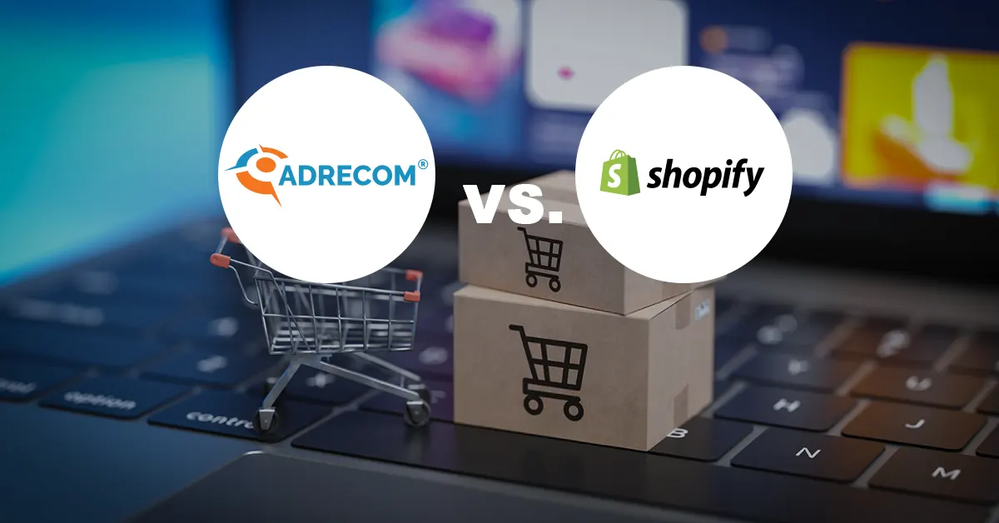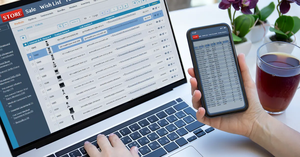
In today's evolving digital commerce landscape, selecting the right eCommerce platform is about more than product pages and checkout buttons. Businesses with complex B2B requirements, content-rich strategies, or multi-site operations need more than just a storefront—they need a flexible engine built for scale, customization, and operational control.
In this post, we compare Shopify and Adrecom, focusing on how each platform meets the needs of growing and complex organizations—especially those requiring quote management, proposal workflows, and self-service portals for distributors and resellers.
Platform Overview: Simplicity vs. Sophistication
Shopify is renowned for its ease of use, quick deployment, and vast app ecosystem—making it ideal for small to medium-sized B2C retailers, DTC brands, and eCommerce newcomers.
Adrecom, by contrast, is engineered for businesses with layered operations: multi-brand, multi-site, B2B portals, content-driven commerce, and deep back-office integrations. It blends CMS and eCommerce into a single enterprise-grade solution that handles sophisticated workflows out of the box.
Quote & Quote-to-Order Workflow: Native in Adrecom
In B2B commerce, the buyer journey often begins with a quote—not a cart. Adrecom supports a native quote management system that lets users:
- Request and revise quotes based on catalog items, quantities, discounts, and account-specific pricing.
- Seamlessly convert accepted quotes into live orders.
- Sync quote data with CRM or ERP systems for sales team follow-up.
Shopify, meanwhile, offers no native quote capability. Achieving this functionality requires third-party apps or costly custom development.
Proposal Management: A Sales Enablement Power Tool
For businesses operating on long sales cycles or dealing in configurable products, Adrecom includes built-in proposal management tools. Users can generate tailored proposals with custom pricing, product configurations, and terms—and manage revisions, approvals, and versions.
This is especially valuable in industries like manufacturing, wholesale, and professional services, where proposals precede every transaction.
Shopify does not offer proposal generation or management as part of its core functionality, leaving such use cases underserved.
Self-Service Distributor Portal: Empowering Partners
Adrecom offers a dedicated distributor portal—designed for resellers, wholesalers, or B2B partners who need autonomy over their purchasing and account data. These portals allow distributors to:
- Log in to view their negotiated pricing, discounts, and payment terms.
- Place and repeat orders.
- Access order history, invoice tracking, and shipping status.
- Manage their own team accounts and permissions.
Shopify lacks a comparable native solution. While some B2B capabilities are available with Shopify Plus, a distributor-specific portal still requires third-party apps and extensive custom work.
Integration & Customization
Adrecom integrates seamlessly with ERPs (like QuickBooks, SAP, and NetSuite), CRMs, marketing tools (like Klaviyo), and shipping/payment providers. Its modular architecture supports tailored workflows and data synchronization—critical for larger businesses that depend on operational cohesion.
Shopify’s strength lies in its app ecosystem, but this comes with limitations:
- High app costs can inflate TCO (total cost of ownership).
- Limited back-end customization unless you're on Shopify Plus.
- Custom logic often requires Shopify's proprietary language (Liquid) and developer support.
Content + Commerce in One Platform
Adrecom is also a full-fledged Content Management System (CMS). For organizations that need more than a product grid—think education, media, nonprofits, or multi-brand portfolios—Adrecom provides:
- Microsites and multilingual support.
- Blog, news, community, and resource hubs.
- Custom landing pages and dynamic content blocks.
- User access controls for gated content and B2B assets.
Shopify offers basic CMS features (blogs and pages), but lacks the flexibility needed for content-rich strategies.
Final Take: Choose the Platform That Matches Your Business Complexity
Use Case | Best Choice |
B2C retail, small catalog | Shopify |
DTC brand launching quickly | Shopify |
B2B distributor or wholesaler | Adrecom |
Proposal-based or negotiated sales | Adrecom |
Multi-site/multi-language brands | Adrecom |
Businesses needing ERP/CRM sync | Adrecom |
Content-rich commerce strategy | Adrecom |
Ready to Grow Beyond Shopify?
If you're outgrowing your current platform—or planning a launch that requires more than out-of-the-box capabilities—Adrecom may be the partner you need. From quote automation and proposals to distributor portals and enterprise integrations, we help brands scale smarter.
Contact us to schedule a live demo or explore how Adrecom can power your next stage of growth.




